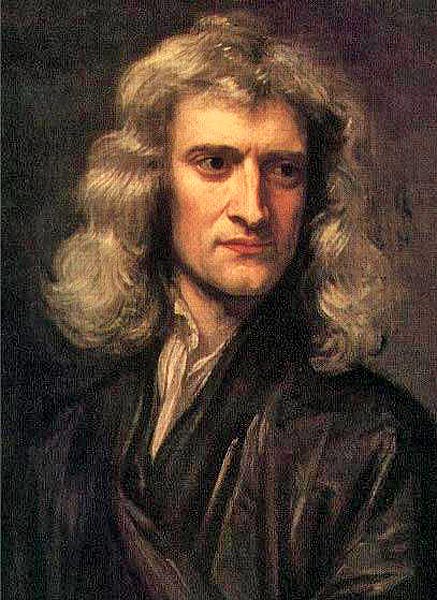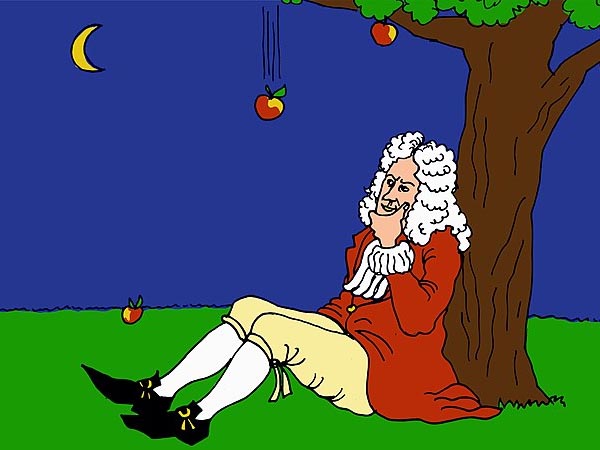 |
| Sir Isaac Newton |
Click to see Vol. I, Issue 8 of the newsletter in which this article first appeared.
Listen to the audio of this article!
The English scientist Sir Isaac Newton (1642-1727) is famous, and for good reason--after all, not many people have had a universe named after them!
According to the Julian calendar, which England used at the time, Newton was born on Christmas Day. Although many countries were using the Gregorian calendar by the time he was born, England did not make the change until 1752--nearly a quarter of a century after he was born. We use the designation "O.S." or "Old Style" to refer to Julian dates; "N.S." or "New Style" means Gregorian dates. So Sir Isaac was born December 25, 1642 O.S., and January 4, 1643 N.S.
His father, a farmer also named Isaac, died three months before the boy was born. Young Isaac was born prematurely, and--after his mother remarried when the boy was just three years old--was raised by his grandmother. (He despised his mother's new husband, and wrote in a journal that he had once threatened to burn them both "and the house over them"!)
As a young man, Newton may once have been engaged, but he never married. He studied Latin--but not mathematics--until age 17, when his now-widowed mother tried to get him to become a farmer, a job which he hated. He returned to school and became a top student, partly to compensate for bullying by another boy.
Studying at Cambridge from age 19, he soon received scholarships and was able to complete a master's degree, studying Aristotle as well as "modern" philosophers like Descartes and the astronomers Galileo and Kepler.
Among his many accomplishments, Newton is best-known today for a few ideas, such as discovering the mathematical study of change known as calculus. (This happened at about the same time as the German scholar Leibniz discovered the same ideas, independently of Newton). Newton wrote about calculus in his best-known work, the Principia Mathematica (1687).
Another field he studied was optics. Newton determined the names we use for the seven colors in the rainbow: red, orange, yellow, green, blue, indigo, and violet (remembered by the mnemonic ROY G. BIV).
Interestingly, Newton was something of a mystic. He believed that, despite its natural and knowable laws, the universe was dependent on God at its root. It is ironic, then, that the mechanical view of the world came to be referred to as "the Newtonian universe," an idea that held until Einstein presented a new model in the 20th century.
Now about that apple…
It's commonly said that one day Newton was sitting under an apple tree when a piece of fruit fell and bonked him on the head. Inspired by this, he invented gravity.
But is this story true?
Well, first, gravity cannot have been "invented" by anyone, since it is a natural property of physical things and inheres in matter. Newton called it "an attractive force."
Well, then, perhaps it was "discovered"? No. People have known from time immemorial that if you step off a high place, you will fall. The old saying is, "What goes up, must come down"!
Instead, as he himself told the story, Newton saw an apple fall (it did not hit him on the head!), and asked himself, "Why should that apple always descend perpendicularly to the ground"--that is, fall straight down--"Why should it not go sideways, or upwards? But constantly to the earth's center?" [Unless, of course, it was acted on by another force, like wind, or someone hitting it with a stick.] "Assuredly, the reason is, that the earth draws it." This observation inspired him to formulate the laws of gravity.
Something, he thought, was pulling the apple toward the very center of the earth! His exploration of this phenomenon led him to formulate what is now called "Newton's Law of Universal Gravitation." More important to his studies than an apple was the behavior of the moon, which by logic--since it is traveling at a great speed--ought to fly off into space. What is keeping it from doing so? The answer is, the attraction between the moon and the earth--that is, gravity.
His law is best expressed as a complex mathematical formula, but let's try to put it into words:
"Every particle attracts every other particle in the universe with a force [gravity] that is directly proportional to the product of their masses and inversely proportional to the square of the distance between their centers."
Oversimplifying, the greater the mass of an object, the greater its attraction to other objects; and the farther apart two objects are, the weaker the gravitational pull between them.
Let's just leave it at that!
PRACTICE:
Vocabulary: Match the words to their meaning. Correct answers are in the first comment below.
- astronomers
- attraction
- bullying
- designation
- despised
- gravity
- inheres (in)
- inversely
- mass
- mechanical
- mystic
- optics
- particle
- perpendicularly
- square
- like a machine; operating without intelligent choices being made
- the study of light
- exists permanently and inseparably in
- hated
- drawing power
- a small bit of matter
- the force that keeps us on earth
- the quantity of matter in something
- a name; a description
- at right angles to; straight up and down when compared to the earth
- people who study the stars and planets
- being pushed around; being picked on
- a number times itself
- oppositely
- a person who has unusual, unscientific experiences of the "other world"
Questions to Answer: Answer the following questions in your own words. Suggested answers are in the first comment below.
- Which type of calendar do we use today, the Julian or the Gregorian?
- What did Newton's mother want him to do?
- What did Newton discover at about the same time as the German scholar Leibniz?
- What was one of Newton's achievements in the field of optics?
- Did Newton discover gravity?
Questions to Think About: These questions do not have "right" or "wrong" answers. They only ask your opinion.
- Are you surprised to learn that Newton was a mystic? Is it strange for someone to believe in unscientific experiences and scientific principles at the same time?
- Why do you think people like to say that Newton got bonked on the head by an apple?
- Newton seems to have had a difficult family life. How do you think this may have affected his success as a scholar?



ANSWERS:
ReplyDeleteVocabulary: 1. K; 2. E; 3. L; 4. I; 5. D; 6. G; 7. C; 8. N; 9. H; 10. A; 11. O; 12. B; 13. F; 14. J; 15. M
Questions to Answer (suggested answers; yours may be written slightly differently)
1. We use the Gregorian calendar.
2. Newton's mother wanted him to be a farmer (like his father).
3. Newton discovered calculus at about the same time as Leibniz.
4. Newton determined the names we use for the seven colors in the rainbow.
5. No, Newton didn't discover gravity. But he formulated a law that describes how gravity works.
Questions to Think About do not have any single correct answer. However, any answers you give should be supported by what you read or by things you know ("I think... because...").